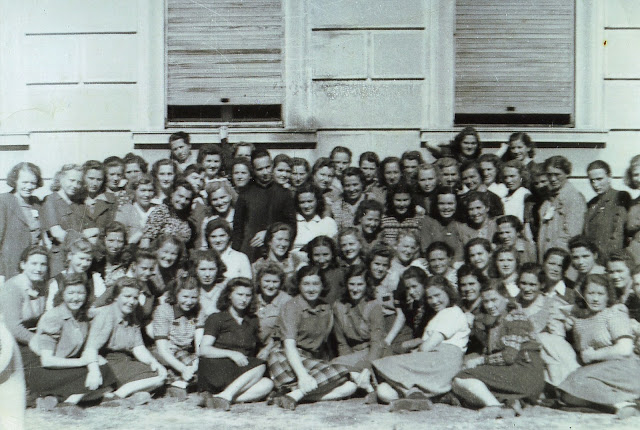 |
Anica (front row left) with her family before the war.
|
I awake in a startle to the nearby sound of knuckles on glass.
It is not a loud noise - only the shallowest of sleepers would hear it. I slide
out from under my warm quilt and silently enter the kitchen of my sister’s
home. Through the window Jernej stands. Sweat glistens at his temple, his
breath fogs the cold glass. I open the
window, the air bites through the warmth of the room. ‘We must all leave now,
get your family and go- the Partisans are close’. And with those few, frantic
words he is gone, making his way invisibly through the night to warn others in
danger. I stand there unmoving, the still open window and the reality of
Jernej’s words cover my arms in goosebumps and tears well in my eyes. I close the window in a fury, the tears dry
before they have a chance to fall.
I take the stairs to the bedrooms two at a time. I have to wake
my sister and her husband, collect our things and leave home - and we don’t
have much time to do it.
I had prepared myself for this, envisioned this happening hundreds
of times over the past two weeks. Waiting for it to happen - praying it never
would.
I swing the door open to wake them and find them already
collecting their belongings, the things they just could not bear to leave
behind. They are silent, silhouettes packing by the glow of the moon. They had
been waiting for the knock as well.
I quickly turn and leave towards my room,
Just two weeks earlier I kept my bag packed by the door - ready
to leave at a moment’s notice. I slept fully dressed every night – two nights I
even slept with my shoes on my feet.
But days and nights passed without event and the Americans were
closing in on the Partisans. We heard their airplanes rumble over top every
day, their Tommy guns within earshot. I believed the Americans would save us
from Tito. The fear of being forced to flee lessened and I began to take items
out of my rucksack and not return them.
And so tonight I find my satchel empty but for three pairs of
underwear. I throw in a sweater, wool stockings, and 2 wool skirts. It is not
hard to choose what to bring. I own very little. The Partisans having already
burned down my family home in one of their revenge night raids, most of my
belongings burning up with it.
I turn to leave my room and find Maria and Matija in the door. Their faces look too old for
their ages. My own sadness was shadowed heavily by my sister’s. I had been
hardened by the war, had lost so much already. But she had remained somewhat
unscathed, protected by the luxury of a living husband at home.
Three of us leave the house silently and unseen through the back
door - a knowing neighbour is a dangerous thing.
We hurry to my brother’s house. Understandably, no one in his
house answers our knocks on the back door. Knocks at the door in the night
usually led to family members disappearing for months at a time. The fortunate
ones returning emaciated, scarred. But most never came back home.
We throw pebbles and twigs at the bedroom window in vain. The house
remains dark and still. Too much time has passed and we cannot wait any longer.
We must move on. Perhaps they have left already. Perhaps we will see them on
the road.
We take the main road out of Cerknica and as dawn breaks we join
the hundreds of fleeing farmers and peasants. Many loaded down with rucksacks,
the luckier families have horsecarts or mules. My satchel suddenly feels light
with the absence of any food or drink. Those of us on foot travel faster but
all I can see ahead and behind me is the sad line of shuffle dark blotches
forming a squiggly line through the countryside. The sight of a countryside in
exodus.
 |
Families and their loaded carts trying to make their way to the safety across the Austrian border May 1945
|















